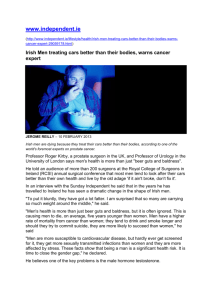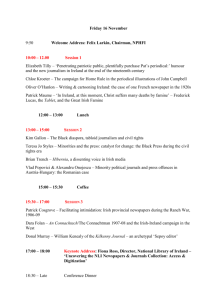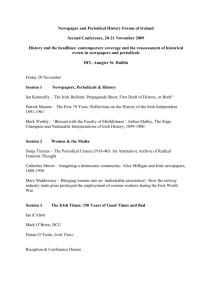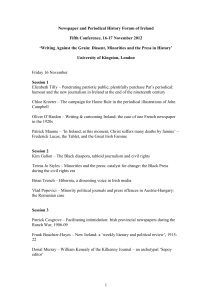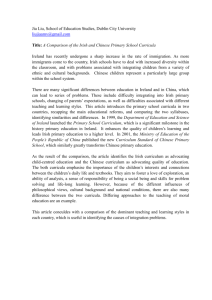memoir fo shooo
advertisement
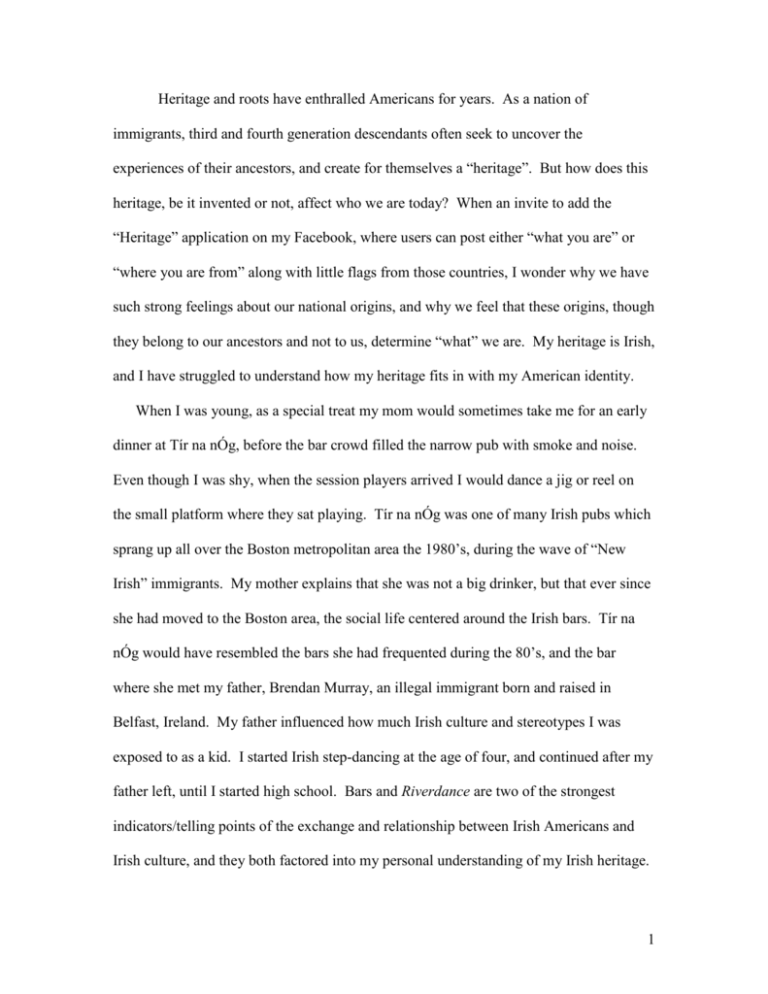
Heritage and roots have enthralled Americans for years. As a nation of immigrants, third and fourth generation descendants often seek to uncover the experiences of their ancestors, and create for themselves a “heritage”. But how does this heritage, be it invented or not, affect who we are today? When an invite to add the “Heritage” application on my Facebook, where users can post either “what you are” or “where you are from” along with little flags from those countries, I wonder why we have such strong feelings about our national origins, and why we feel that these origins, though they belong to our ancestors and not to us, determine “what” we are. My heritage is Irish, and I have struggled to understand how my heritage fits in with my American identity. When I was young, as a special treat my mom would sometimes take me for an early dinner at Tír na nÓg, before the bar crowd filled the narrow pub with smoke and noise. Even though I was shy, when the session players arrived I would dance a jig or reel on the small platform where they sat playing. Tír na nÓg was one of many Irish pubs which sprang up all over the Boston metropolitan area the 1980’s, during the wave of “New Irish” immigrants. My mother explains that she was not a big drinker, but that ever since she had moved to the Boston area, the social life centered around the Irish bars. Tír na nÓg would have resembled the bars she had frequented during the 80’s, and the bar where she met my father, Brendan Murray, an illegal immigrant born and raised in Belfast, Ireland. My father influenced how much Irish culture and stereotypes I was exposed to as a kid. I started Irish step-dancing at the age of four, and continued after my father left, until I started high school. Bars and Riverdance are two of the strongest indicators/telling points of the exchange and relationship between Irish Americans and Irish culture, and they both factored into my personal understanding of my Irish heritage. 1 In a snapshot which my mom’s note identifies as my first day of SMILE preschool, I pose for the camera, ready for my glamour shot: I probably felt like hot stuff in my 101 Dalmatians sweater, jumper, and with the bow in my hair. The photo is black and white, but it’s a sunny day. My arms are outstretched, like tilted plane wings. My right leg crosses over my left, my toe jauntily stubbing the grass. I’m showing off the starting position I’ve learned in Irish dance class, which I have been going to for about a year now. It’s amazing how much I resemble the lead of Riverdance, in his striking, show-ending pose. Michael Flatley and Jean Butler wouldn’t dance their way into American consciousness for another two years, but I certainly look ready to greet them when they do. My dad had a lot to do with the amount of Irish culture I was exposed to as a child. He made me my first cup of breakfast tea with milk and sugar, which I drank every morning. He also lived up to less laudable stereotypes of drunkenness and temper. I do not remember ever wondering about my father’s being Irish, or how that related to me. Irish dancing has always been something I did, not because of my dad’s influence. It wasn’t until my father left us that I began trying to analyze where and how Ireland fit into my life. I associated Ireland and my Irish heritage with my father, and therefore the two became emotionally entangled. As I grew older, my mother remarried, and our visits to Ireland stopped. I stopped dancing, switched to coffee, and thought less and less about Ireland. However, when Riverdance came to Boston again this past year, I got the urge to go, and began revisiting the question of my “Irishness”. 2 Riverdance packaged Irish culture in a flashy, contemporary package, yet played to the “diaspora” story Irish Americans associate with their heritage. In fact, it’s basically a testament to the success of the Irish in America, and their ability to assimilate. Asking another person the question “what are you” has come to be synonymous with inquiring about that person’s ancestery. It’s an interesting jump to make from the nationality of our ancestors, to our personal identity. It’s in reaction to feeling “white washed” of culture and heritage, and Irish American heritage has become a very popular heritage to claim, because it enables the claimer to retain status as a white person. People like to research their ancestors, and feel that what they find is pertinent to their present identity. What is heritage, if it can be invented and claimed at will, without being passed through generations of family? When I think about my heritage, I associate my Irishness with my dad and my American heritage with my mom’s side of the family. My mom is descended from Irish immigrants as well, but my father’s being a native seems to trump her Irishness in my eyes. My father it my connection tom Ireland today. I have never really considered my mother’s Irishness. I associate Ireland with my father, because his being a native seems to trump her being a descendant. In talking with my mother about this assignment, I discovered how she too had expressed her Irishness: she lived with Irish immigrants, socialized in Irish pubs, married an Irish man, wrote for The Irish Voice, and after her divorce, harbored a hope that my sister and I would be able to maintain a relationship with our father, and Ireland, through summer visits. My grandparents have taken interest in their Irish heritage, and have made the trip to Ireland to visit the Irish Moynihans. 3 I remember our visits to Ireland, the last of which was when I was seven. My memories of Ireland are misty. Maybe I mean that literally, after all, it’s a country of ceaseless drizzle. I remember my Auntie Patricia’s house the best, and how it filled with smoke when my father’s brothers came over. I remember seeing them troup into the cramped living room dressed as women, in preparation for a parade. Patricia’s dog Max, and my cousin Fiona’s dog with the fluffy tail, and Auntie Geraldine with the big bull dog, and my dad’s one legged stray who he had named Madra, the gaelic word for “dog”. My cousins loved to hear my American accent. We were playing in the street once, and Fiona was trying to get my to speak for the entertainment of her and her friends, and I was so embarrassed that I just kept stuffing my mouth full of candy so I wouldn’t have to. I quickly adopted their brogue, and brought it back home with me. I remember my dad making sausage for breakfast, and my sister saying that it looked like poop. I remember my mother trying to drive on the wrong side of the road. I remember road trip we took into the South of Ireland, across the border which my father refused to recognize, and seeing the grave of St. Patrick and the Cliffs of Something and Giant’s Causeway. I remember going to an Irish dance class, the teacher being friends with my teacher at home. The class was much larger, the dances were different from the one I knew, and even though I had been dancing as long as the other girls, I felt I didn’t belong. The teacher made himself my partner and we did a group dance I was happy. I went with my cousins under a fence and along a field, and we played in the mud and came home for supper. I had never been allowed to go off and play by myself before. We didn’t have to wear seatbelts, and people shared cabs. Americans note that Belfast is in Northern 4 Ireland, but that is a distinction my father would have refused to acknowledge, being from a Catholic family with strong ties to the Irish Republican Army. My experience with my Irishness has been very different from most Irish Americans’. Looking for Ireland in the present, as opposed to the past. Having an existing emotional relationship with Ireland and my relatives there. Hearing about the lives of my parents appeals to the need inside of me, and it seems many other Americans, to distinguish myself from the rest of the population, by the legacy of my ancestors. My reaction to stories about the Murray family’s IRA alleigiance and activism, my father throwing Molotov cocktails, and accounts of the abuse Catholics in Northern Ireland were subject to is a sort of pride in the trials and general bad-ass-ness of who I can claim as my family. I myself am not especially rebellious, or passionate about a cause, and have never made any significant stands against the law. It is in the actions of my father, uncles, and aunts that I can see a bright spark which I want to share credit for. The search for heritage seems to be a search for a story which appeals to our dissatisfaction with our own lives. When we feel we haven’t accomplished anything meaningful, it can be rewarding to look at the lives of our ancestors, and take pride in their actions. People want to claim ethnicity—in the great American melting pot, maybe it feels scary to not have a concept what was originally melted. 5



